译林高中英语模块三Unit1复习导学案设计(练习有答案)
- 格式:docx
- 大小:38.39 KB
- 文档页数:15
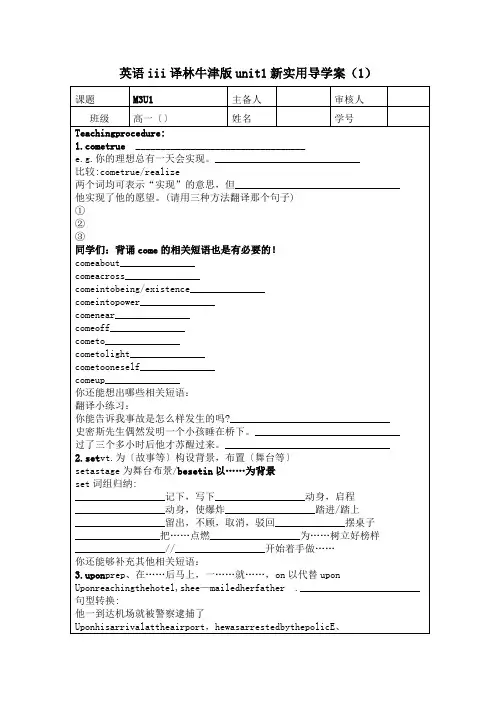
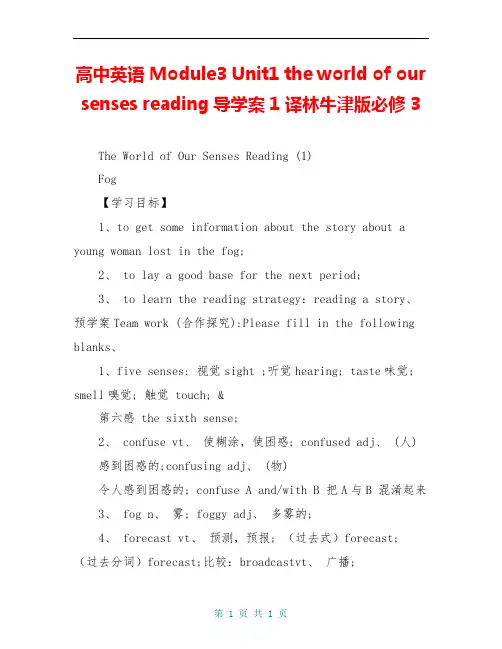
高中英语 Module3 Unit1 the world of our senses reading导学案1 译林牛津版必修3The World of Our Senses Reading (1)Fog【学习目标】1、to get some information about the story about a young woman lost in the fog;2、 to lay a good base for the next period;3、 to learn the reading strategy:reading a story、预学案Team work (合作探究):Please fill in the following blanks、1、five senses: 视觉sight ;听觉hearing; taste味觉; smell嗅觉; 触觉 touch; &第六感 the sixth sense;2、 confuse vt、使糊涂,使困惑; confused adj、 (人)感到困惑的;confusing adj、 (物)令人感到困惑的; confuse A and/with B 把A与B 混淆起来3、 fog n、雾; foggy adj、多雾的;4、 forecast vt、预测,预报; (过去式)forecast; (过去分词)forecast;比较:broadcastvt、广播;5、 glance at扫视/匆匆地看……; at first glance乍一看;6、 nowhere到处都不; somewhere某个地方;anywhere任何地方,无论何处; everywhere到处,每个地方7、 in sight在视线范围; out of sight看不见,在视野之外;8、 hesitatevi、犹豫,迟疑; n、犹豫不决hesitation;9、 be anxious about sth、担心某物; be anxious to do sth、渴望做某事;be anxious for sth、渴望得到某物;10、analyse/analyzevt、分析; n、分析 analysis;11、puzzle n、谜,疑问; vt、使困惑;puzzledadj、 (人)感到困惑的; puzzlingadj、 (物)令人感到困惑的;Task2: Read the passage on P1 and finish the following table、We dowiththe sense see1、eyes2、 sight hear3、 ears4、 hearing5、 taste tongue/taste buds6、 taste7、 smell8、 nose smell9、 feel hands/feet/skin10、 touch探究案Step1Skimming1、Why did Polly take the Underground to GreenPark?Because it was too foggy for the bus to go to King Street、2、 What was the weather like outside the train station?The fog lay like a thick, grey cloud、3、 How could the man tell that Polly was young ? By hearing her voice、Task2: Read the text quickly and fill in the blanks、PartPlaceWhat happenedPolly’s thought or feelingPart1outside Polly’s work placeShe left workearly because of the1 thick fog、She wondered if2 the buses would still be running、Part2 at the bus stop in the streetThe fog was too thickfor the bus to run to3 King street ,where Polly lived、Part3 in the underground train:at Green Park station A tall man in a dark coat is on the train、She sensed she was4 being watched 、Part4 in Park Street:at the corner of the StreetA rough hand brushed her face、Her heart was beating5 with fear 、Part5 in the streetThe old man took her hand and helped her find6 the way to her home、She wished for someone to come along、Fear held her still、 She began to feel frightened again、Part6 outside P olly’s house at KingStreetThe old man left to help more people7 lost in the fog、Polly was thankful、Step2 Careful reading: Complete the following information『探究一』学习第3页的Reading Strategy(阅读策略),了解这篇故事的要素。

高一牛津英语(译林版)模块三第一单元教案(word版可编辑修改)编辑整理:尊敬的读者朋友们:这里是精品文档编辑中心,本文档内容是由我和我的同事精心编辑整理后发布的,发布之前我们对文中内容进行仔细校对,但是难免会有疏漏的地方,但是任然希望(高一牛津英语(译林版)模块三第一单元教案(word版可编辑修改))的内容能够给您的工作和学习带来便利。
同时也真诚的希望收到您的建议和反馈,这将是我们进步的源泉,前进的动力。
本文可编辑可修改,如果觉得对您有帮助请收藏以便随时查阅,最后祝您生活愉快业绩进步,以下为高一牛津英语(译林版)模块三第一单元教案(word版可编辑修改)的全部内容。
A d v a n c e W i t h E n g l i s h M o d u l e3Unit 1 The world of our sensesPeriond 1: welcome to the unitAims:———to give the Ss the idea that soemtimes the senses affect one another and people may be misled by them to help them to realize how they use their senses in their studies and daily life and to teacch them how to make better use of their senses。
—-—ask Ss to fully participate in the discussion, practise their spoken English, and share their opinions with one another。
Precedures:Step 1 brainstormingAsk the following questions:With what do we see and hear?How do we know that a flower has a pleasant smell?How do we know whether a dish is delicious?What do we do when we want to know whether the wather in the basinis hot or cold?How do we know about the world around us? What are the five senses? (Blackboard: see – eyes-sight—lookHear-ears—hearing—soundTaste—tongue—taste-tasteSmell-nose—smell—smellTouch/feel-skin—touch—-feel)As we all know almost everyone has five senses。
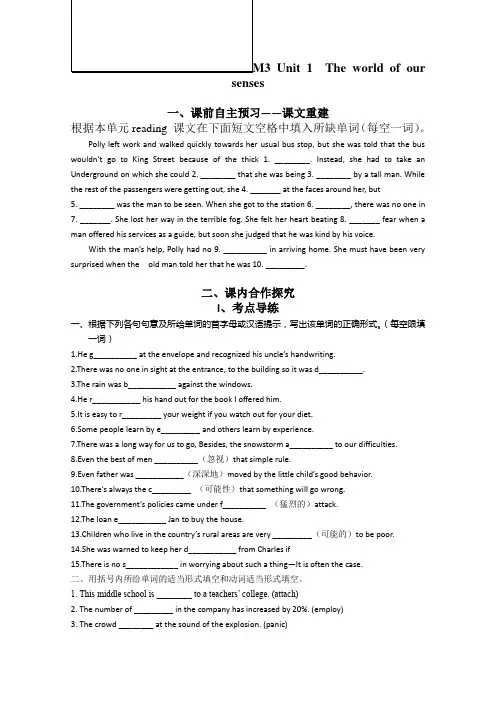
M3 Unit 1 The world of oursenses一、课前自主预习——课文重建根据本单元reading 课文在下面短文空格中填入所缺单词(每空一词)。
Polly left work and walked quickly towards her usual bus stop, but she was told that the bus wouldn’t go to King Street because of the thick 1. ________. Instead, she had to take an Underground on which she could 2. ________ that she was being 3. ________ by a tall man. While the rest of the passengers were getting out, she 4. _______ at the faces around her, but5. ________ was the man to be seen. When she got to the station6. ________, there was no one in7. _______. She lost her way in the terrible fog. She felt her heart beating8. _______ fear when a man offered his services as a guide, but soon she judged that he was kind by his voice.With the man’s help, Polly had no 9. __________ in arriving home. She must have been very surprised when the old man told her that he was 10. _________.二、课内合作探究I、考点导练一、根据下列各句句意及所给单词的首字母或汉语提示,写出该单词的正确形式。

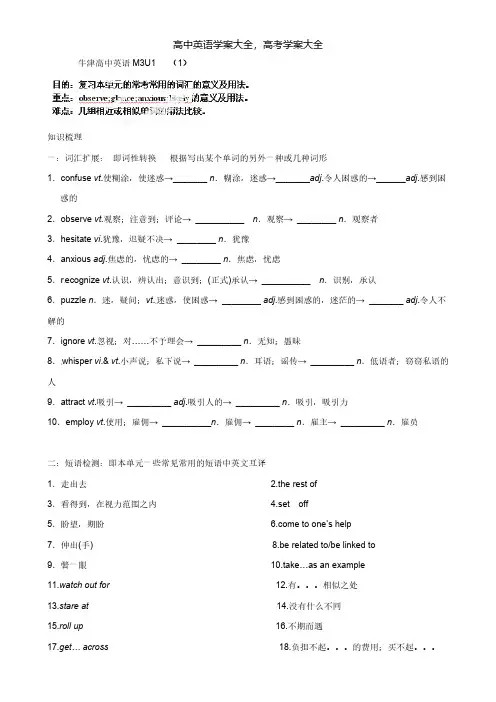
牛津高中英语M3U1 (1)知识梳理一:词汇扩展:即词性转换根据写出某个单词的另外一种或几种词形1.confuse vt.使糊涂,使迷惑→_______ n.糊涂,迷惑→_______adj.令人困惑的→______adj.感到困惑的2.observe vt.观察;注意到;评论→__________n.观察→________ n.观察者3.hesitate vi.犹豫,迟疑不决→________ n.犹豫4.anxious adj.焦虑的,忧虑的→________ n.焦虑,忧虑5.r ecognize vt.认识,辨认出;意识到;(正式)承认→__________ n.识别,承认6.puzzle n.迷,疑问;vt.迷惑,使困惑→________ adj.感到困惑的,迷茫的→_______ adj.令人不解的7.ignore vt.忽视;对……不予理会→_________ n.无知;愚昧8.whisper vi.& vt.小声说;私下说→_________ n.耳语;谣传→_________ n.低语者;窃窃私语的人9.attract vt.吸引→_________ adj.吸引人的→_________ n.吸引,吸引力10.employ vt.使用;雇佣→__________n.雇佣→________ n.雇主→_________ n.雇员二:短语检测:即本单元一些常见常用的短语中英文互译1.走出去 2.the rest of3.看得到,在视力范围之内 4.set off5.盼望,期盼 e to one’s help7.伸出(手) 8.be related to/be linked to9.瞥一眼10.take…as an example11.watch out for12.有。
相似之处13.stare at 14.没有什么不同15.roll up 16.不期而遇17.get… across 18.负担不起。

高中英语 M3 Unit1 The world of our senses reading导学案译林牛津版必修3The World of Our Senses Reading (2)Language pointsLearning aims:1、To read and understand the text further、2、 To master the key words and expressions of the text、3、 To master some important sentence patterns、预学案Fill in the blanks、1)笼罩在灰白的薄雾中2)下班3)走进浓雾中4)事实是 (5)其余的乘客6)扫视……7)在视线范围8)动身(前往…)9)希望某人做某事10)抬头凝视11)当心,提防 (某物)12)如释重负地13)偿还,回报14)穿过,被理解探究案&练习案1、When Polly left home that morning, the city was already _______ _________ a grey mist、波莉离开家的那天早晨,这座城市已笼罩在灰白色的雾气中。
Line2cover vt 遮盖,掩盖;占地(面积);走过,行走(路程);读完;采访;(钱)够用;包括,涵盖拓展:be covered with 由……所覆盖 cover up 掩饰,隐匿under (the)cover of 在、、、、、、掩护下;以、、、、、、为借口from cover to cover 从头至尾under the same cover 在同一封信或同一邮包中2、step out into the fog =walk faster into the fog 加快脚步进入浓雾中Line43、 wonder vt、 Line5 (1)对…感到疑惑,想要知道+ 疑问词引导的句子或不定式 (2)礼貌地提问或请人做事时说I wonder if…vi 对…感到惊讶(at/ about) n、(It’s )no wonder (that)、、、难怪……I wonder = I wonder_______ _________ ________ __________我不知道下一步该做什么。

Unit 3, Module 1I. 单项选择:1. --- Are you______ the exam?--- No,I need a few more hours; I still can’t remember all the new words.A. preparing forB. preparingC. prepared forD. prepared2. English words are not always spelt______ they are pronounced.A. on the wayB. by the wayC. in a wayD. the way3. Ice used to______ used to______ the air in a room.A. be; coolB. be; coolingC. being; coolD. being; cooling4. Tom, a girl__________ herself Mary is looking for you.A. calledB. callsC. to callD. calling5. You must do everything_____ you_______.A. as; are told toB. as; are toldC. like; are toldD. when; are told6. I’d like to buy a house---modern, comfortable and_______ in a quiet neighbourhood.A. in allB. above allC. after allD. at all7. ______ life pace continues to speed up, we are quickly losing the art of enjoyment.A. WithB. WhenC. AsD. While8. Listen! His family must be quarrelling, ____________?A. Mustn’t itB. isn’t itC. aren’t theyD. needn’t they9. ---Alice, you feed the bird today, ________?---But I fed it yesterday.A. do youB. will youC. didn’t youD. don’t you10. ---You are not a new member, are you?---_________. I _________ only yesterday.A. No, I am; was on the teamB. No, I’m not; joinedC. Yes, I am; took part inD. Yes, I am; joined11. ---It was fine yesterday.---_________. And a very day for fishing, isn’t it?A. So it wasB. I was soC. So it isD. So is it12. Experts suggest that teenagers______ at least 30 minutes______, five times a week, ______is easy to do.A. must spend; exercising; whichB. should spend; exercising; thatC. must spend; in exercising; thatD. spend; exercising; which13. The man pulled out a gold watch, ________ were made of small diamonds.A. the hands of whomB. Whose the handsC. which the hands ofD. the hands of which14. Large amounts of energy_______ wasted in our country every day, and _______ has caused agreat loss.A. is; thatB. are; thatC. is , whichD. are; which15. The beautiful village, _________ we spent our holiday last month,lie at the foot of amountain.A. whereB. thatC. whichD. whatII. 单词填空:1. He was once a leading f__________ in the community(社区).2. The first impression really c______________ in the job interview.3. Drinking water is good for your health; it can make your bodys__________ clean.4. Parents should teach their children to behave p__________ in public.5.Though it was noisy outside, she sat there quietly with all her attention c__________ on herhomework.6. You should have taken the weight-loss pills ___________ (遵循) the doctor’s instructions.7. I know that the __________(压力) to stay slim is a problem,especially for an actress.8. We have had large a__________ of help from people since we came here.9. It can take many years to r__________ from the death of a loved one.10. Her face turned red at the __________(尴尬) question.11. Most girls today want to lose weight and have a__________ figures.12. Success came after many f________.13. These days I don’t feel so e___________, so I wonder if I am ill.14. Many young girls, who want to lose weight, are always going ond__________.15. Modern farming methods can have a negative e__________ on the environment.16. During the past ten years, we have made many great a__________.17. You’re only a few pounds o__________, so you needn’t take any weight-loss pills.18. It's a _________ (宽慰) to know that she is safe.19.The factory has a lot of modern ___________(设备).20. He's e_________ at cooking good cheap meals.21.The accident did a lot of d________ to the car.22.We all went, Tom _________(包括).23.I read the whole book without s_________ a page.24.The _______(丧失)of his wife was a great blow(打击) to him.Unit 3, Module 1单项选择CDADA BCCBD DDDBA单词拼写1. figure2. counts3. system4. properly5. concentrated6. following7. pressure8. amounts9. recover 10. embarrassing11. attractive 12. failures 13. energetic 14. diets 15. effect16. achievements 17. overweight 18. comfort 19. equipment 20. expert 21. damage 22. included 23. skipping 24. loss。

英语iii译林牛津版unit1新实用导学案(3)课题M3U1 主备人审核人班级高一〔〕姓名学号一、课前预习Readthetextagainandpaymuchattentiontotheimportantanddifficultsentence s.二、课内合作1.feed〔feed---fed---fed;feeding〕v,n、用··喂养,靠吃··过活,以··为能量★用例句归纳句型:1.Hehasalargefamilytofeed.-->Hehastofeedalargefamily.2.feedadogonmeat._______________________3.我们喂肉给狗吃。
___________________________4.feedthecomputerwithinformation---feedinformationintothecomputer. 同学们,参考完例句逐一总结出结论吧!!1.2.3.4.2.wound〔1〕n、c,______________翻译:1.我想明白他的伤口在哪里______________________________2.流血的伤口______________________3.轻伤___________________(2)vt.________他的胳膊受了伤__________________________辨析:hurt__________________________________________________injury_________________________________________________wound_________________________________________________harm___________________________________________________3.Stick yourfingerintheshark’seye★★stick〔1〕vt〔stick—stuck---stuck〕_____________;_________________翻译:1.Don’tstickthatneedleintoyourfinger.___________________________2.Canyoustickthepiecesofthisvasebacktogether?___________________ _(2)[C]________________________________翻译:Theoldmanhadasticktohelphimwalk.__________________________短语经历:Stickaround_________________stickby_______________Stickout____________________stickoutfor_________________辨析:insiston和stickto4····times+greater/faster/bigger·····than···表倍数(1〕‘A+be+倍数+as+计量形容词原级+as+B’这棵树是那棵树的三倍高。
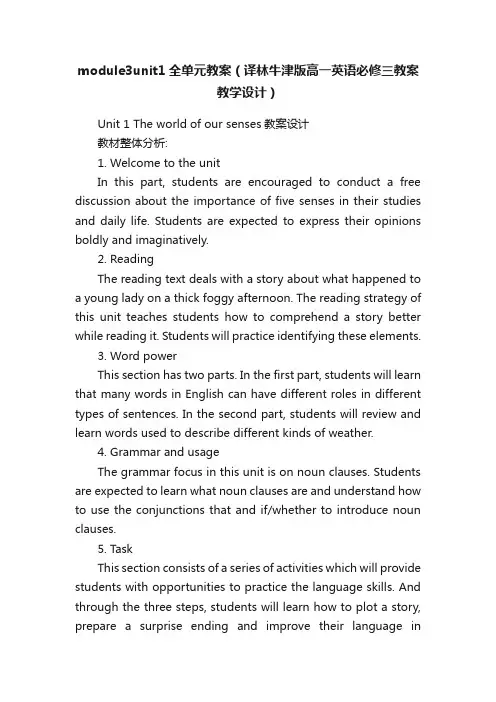
module3unit1全单元教案(译林牛津版高一英语必修三教案教学设计)Unit 1 The world of our senses教案设计教材整体分析:1. Welcome to the unitIn this part, students are encouraged to conduct a free discussion about the importance of five senses in their studies and daily life. Students are expected to express their opinions boldly and imaginatively.2. ReadingThe reading text deals with a story about what happened to a young lady on a thick foggy afternoon. The reading strategy of this unit teaches students how to comprehend a story better while reading it. Students will practice identifying these elements.3. Word powerThis section has two parts. In the first part, students will learn that many words in English can have different roles in different types of sentences. In the second part, students will review and learn words used to describe different kinds of weather.4. Grammar and usageThe grammar focus in this unit is on noun clauses. Students are expected to learn what noun clauses are and understand how to use the conjunctions that and if/whether to introduce noun clauses.5. TaskThis section consists of a series of activities which will provide students with opportunities to practice the language skills. And through the three steps, students will learn how to plot a story, prepare a surprise ending and improve their language instorytelling.6. ProjectThe project in this unit is designed to help students learn and use English through doing a project. The purpose of this section is to help students use what they have learnt to finish a project by working together.7. Self-assessmentThis section aims to help students determine the progress they have made.Period 1. Welcome to the unitTeaching goals:Encourage students speak out to practice their oral English .Arose their interest in learning this unit through activities.Let them know the importance of senses in daily life.Teaching important and difficult points:Help students prepare for their discussion, making sure that they are fully prepared before the lesson.Teaching ProceduresStep1. BrainstormingAsk students the following questions:1. With what do we see and hear?2. How do we know whether a dish is delicious?3. How do we know that a flower has a pleasant smell?4. What do we do when we want to know whether the water in the basin is hot or cold?5. How do we know about the world around us?As we all know, almost everyone has five senses, which are used everywhere and all the time. We learn about the world through the five senses. We use the five senses to study, work and relax, but there are some people who have lost one or moreof their senses.Step2 Presentation1.What would happen if you lost one or two of your senses?A person who cannot see is blind and someone who cannot hear is deaf..2. Do you know how blind people can read?(They can read by touching raised dots which represent numbers and letters. This system is called Braille.)3. How do the deaf communicate with each other?(They use body language or sign language.)Step3 DiscussionLook at the four pictures and answer the question below each picture.1.What can you see in this picture?2.How would you judge the length of the two lines?3.How can you prove that the two lines are straight?4.Can the symbols be read in only one way?5.Why are people misled by their own eyes?Step4 Language studyFill in the blanks with words that have something to do with “senses”:When he got there, he _________ that there was a dark hole. He ________ into it, but could ________ nothing. He ________ with his ears, he could _______ nothing, either. He _________ it for a long time. He _______ something strange. He ___________ the side of the hole. It ______ hot. Suddenly some noises were ________ from the hole. It ________ like someone was cooking inside.Step5 Discussion1. Read the three questions in the short passage and discuss them in groups of four.2. Report your answers to the whole class.Step6 Assignments1. Preview the reading part, do exercise C1 and C22. Preview the reading strategyPeriod 2 ReadingTeaching goals:Improve Ss’ reading ability.Enable Ss to master some important language points.Make sure Ss can learn to help each other in their daily life.Teaching important and difficult points:Master the use of some language points.( wish for; reach out ; watch out for; pay back…)Retell a story with a surprise ending.Teaching proceduresStep1: Lead-inAsk students to talk about the climate or the weather in the place where they live:What’s the weather usually like in spring in Liyang?Which season do you think is the best? Why?Do we sometime have foggy days here? When?How do you feel on a foggy day?Have you ever lost your way in the fog? What would you do if you got lost in the fog?Which city has the name of “foggy city”?Step2: Reading1. Ask students to go through the passage as quickly as they can and try to find answers to the four questions in part A.2. Ask students to read the passage again and complete partsC1and C2.3. Ask students to fill in the blanks according to the text.Step 3: ListeningListening to the text and read together with it.Step 4: Reading strategy1. Guide students to read the Reading strategy for the article and teach them the elements of a story.2. Give students another story to read and practice identifying the essential elements of a story.Step 5: PracticeAsk students to complete Parts D and E.Step 6: Assignments1. Finish A1 and A2 on page 90 of the Workbook.2. Retell the story in their own words.3. Find out the difficult points in the passage.Period 3 Language studyTeaching goals:Help students understand fully of the text.Deal with some difficult sentences and useful language pointsTeaching important and difficult points:mastering the use of some of language points: in sight, wish for, reach out, watch out for, pay back, be frozen with, be related to, be linked to, make sense, make the most of, can’t help doing, Teaching proceduresStep1 RevisionRetell the story:Help the students retell the story Fog in their own words. Use the chart to help them:Outside Polly’s working place-----at the bus stop on the street------ in the Underground train-----at Green Park station------- in Park Street------- at the corner of the street----- in thestreet near King Street------ at 86 King StreetStep2 Difficult sentencesRead and understand the following sentences, then remember in mind:1. Once out in the street, she walked quickly towards her usual bus stop.2. ‘Sorry, Miss,’ replied the man, ‘the truth i s that the fogs too thick for the bus to run that far.3. While the rest of the passengers were getting out, she glanced at the faces around her.4. The tall man was nowhere to be seen.5. As she walked along, she heard the sound of footsteps, but by the time she reached the corner of the street, the footsteps were gone.6. Polly found herself staring up at a man standing with his hand resting on her arm.Step3 Useful words and phrasesStep 4 AssignmentFinish the learning plan.Period 4 Word powerTeaching goals:Make sure students can know the different roles some words can have in different types of sentences.Enable Ss to master the meanings of some words used to describe different kinds of weather.Teaching important and difficult points:Train Ss to guess and understand the meanings of the words according to the context and pictures.Teaching proceduresStep 1 RevisionCheck the homework assigned the day before.Step2 BrainstormingStep 2. Brain stormingWrite down two sentences on the blackboard:Once out in the street, she walked quickly towards her usual bus stop.“Here we are, King Street.” He stopped.Which word has two meanings and two parts of speech?How many other words which have more than one part of speech can you think of?Step 3. Parts of speech1. Ask students to read the speech bubbles on page 6. Make sure that they pay attention to the word rest and get them to describe the f=different meanings of it in different parts of speech. Then have them read the instructions for Part A.2. Ask students first to complete the table in Part A individually and then to discuss in pairs the answers. Encourage students to make different sentence.. Then check the answers with the whole class.Step 4. PracticeAsk students to complete part B according to the instructions. Then have one or two of them read the short report.Step5. Describing the weather1.Ask students what words they use to describe different kinds of weather. Write down on the blackboard the word students say.2. Ask students to practice reading in pairs the dialogue in Part A. They may look at the symbols in Part B for reference.3. Have students first look at the symbols for different kinds of weather and then let them read the weather report in the firstspeech bubble.4. Ask students to complete the second speech bubble by looking at the three pictures below it.Step6. Assignments1. Finish the learning plan exercise2. Review the grammar and usage--- noun clauses.Period 5-6 Grammar and usageTeaching goals:Make sure the students understand what the noun clauses are.Ss should know the different use of noun clauses.Learn to use conjunctions that, if/whether.Teaching important and difficult points:Noun clauses can be used as different parts in a sentence.The use of that in subject clause and the different use of if and whether.Teaching procedures:Step1. Introduction to noun clausesWhat is noun?What is the use of noun?What is noun clause?(by reading some sentences):1.When we will start is not clear.2.Mrs Black won’t believe that her son has become a thief.3. My idea is that we should do it right now.4.I had no idea that you were her friend.Step2. Presentation1. Ask students to read Part 1 on page8 so that they will know that a noun clause can be used as the subject of a sentence. More sentences can be given to the students.1) That he will succeed is certain .2) Whether he will go there is not known .3) What he said is not true .4) Where he hid the money is to be found out .Have students read the sentence in which it is used as an empty subject:Who will go makes no difference.= It makes no difference who will go.That she was able to come made us very happy.=It made us happy that she was able to come.2. Ask students to read Parts 2 so that they will know that a noun clause can be used either as the object of a verb or a preposition in a sentence.1) They know that the habit will kill them.2) He asked how much I paid for the violin.3) He made it clear to the public that he did an important and necessary job .4).I find it necessary that we should do the homework.Ask students to read the two sentences in which it is used as an empty object.3. Ask students to read Part 3 so that they will know that a noun clause can be used as the predicative after the link verb be.1)The question is whether we can rely on him.2)That’s because we were in need of money at that time .3)He looked as if he was going to cry .4)That’s why I was late4.Explain to students what apposition means. Then have the students read Part 4.Step3 PracticeAsk the students to read the article on page 9 and to describe the main idea in their own words. Make sure that they know whatthey need to do and that they can identify all the noun clauses.Step4 PresentationNoun clauses beginning with that or if/whether1.Ask the students to read Part 1, which is about using that to introduce a noun clause.2. Have students read Part 2, which is about using if or whether to introduce a noun clause.When do we use if/whether to introduce a noun clause?When can we only use whether bet not it?Step5 PracticeAsk students to finish exercises on page11.Step6 Assignment1. Finish the exercises in learning plan.2. Finish C2 on page 92 of the workbook.Period7---8 Task: T elling a storyTeaching goals:Make Ss know the sequence of a story.Train Ss’ ability of telling a story effectively by using pictures with speech bubbles.Improve Ss’ ability of writing a story by using adjectives and adverbs.Teaching important and difficult points:Make sure Ss know the importance of adjectives and adverbs in the story.Enable Ss to write a story correctly.Teaching proceduresStep 1 Revision1. Check homework.2. Do some exercises to revise the noun clauses.Step 2 Skills building 1: Plotting a story1. Ask students to read part A on page 13. They need to know what they have been asked to do and what information they should get when listening to the tape. Have them complete the checklist individually, and then ask them to check their answers with their partners to see if they have the same answers. The class can listen to the recording again if necessary.2. Ask students to listen to the conversation and answer the questions in Part B. After they finish this part, let them check their answers with their partners to make sure that they have got the correct answers.3. Tell students that they will write the beginning of the story using their answers in Part B.Skills building 2: identifying different elements of a comic stripStep3: preparing a story with a surprise ending1. Ask students to read the guidelines on page 15 and make sure that they know what they need to do. Ask them to first work individually and then to check their answers with their partners. If they have different answers, have them discuss which answer is better.2. In pairs, ask students to work out a surprise ending from the five pictures given in Part A. They should draw a picture, write a caption and add thought, speech or sound bubbles where necessary. Encourage students to use their imagination and create any ending which is surprising. Choose some students’ pictures and show them to the whole class. Ask students to decide which is the best picture with a surprise ending.Skills building 3: using adjectives and adverbs in stories.Step 4: improving your story1. Have students read the guidelines in Part A on page 17.Ask them to go over the adjectives and adverbs given in the box. Guide them to point out which words are adjectives and which are adverbs. Ask them to first fill in the blanks with the words in the box, and then write the last paragraph of the story using the sixth picture they drew in Step 2.2. Ask students to think about what good storytellers will do to make others interested and willing to listen to them. Ask students to read the guidelines in Part B. Have them work in pairs to practise telling the story they have just finished. Then ask some students to present their stories in class. The whole class should decide who is the best storyteller.Ask students to read the story of Part A in Writing on page 97 of the Workbook, and then finish Part B. They can do Part B as homework.Step5 Homework1. Ask Ss to write a story.2. Find out the difficult points in Project.Period 9 Project: Producing a TV showTeaching goals:Do some reading.Improve Ss’ ability of writing.Get Ss to cooperate with others.Teaching important and difficult points:Know the general idea of the passage.Make sure Ss know how to write an interesting story.Teaching proceduresStep1 Reading1. Ask students to read the article Shark attacks and find out as much information as they can about sharks.2. Have students read the article again and ask them to findout what unique senses sharks have, what senses sharks use to attack humans and what people can do to protect themselves.3. Ask students to do Part B1 and B2 on page 91 of the Workbook either in class or as homework, so they will have a better understanding of the usage of words and phrases learnt in this section.4. Ask students to do Parts D1 and D2 on page 93 of the Workbook as homework to review the useful words, phrases and patterns they have learnt in this unit.Ask students to do the listening exercises in Part A and B on page 96 of the Workbook to learn more about animals’ senses.Step 2 Language pointsI. Deal with some language points for Ss to understand the letters better.II. If Ss still have questions, help to solve them.Step3 Producing a TV showPlanningAsk students to work in groups of four. First ask them to discuss and choose which animal they would like to focus on. Have them write down the animal’s name and one of its unique senses. As some students may keep pets at home, they will be quite familiar with some pet animals such as dogs, cats or fish. They can choose one of the animals that they are most familiar with. Students should also choose what type of show they will produce. Each group member will be responsible for researching information about one aspect of the animal.PreparingStudents will go to a zoo, watch an animal documentary, read some books or surf the Internet to get the information they need. While they are doing such things, they need to take notes. Theywill get together to discuss what should be included in their show. They will make a list which focuses on how the animal uses its senses and think about how to present the information.ProducingStudents each work on a different part of the TV show. When the different parts are put together, each group member should read the writing carefully, correct the mistakes and add some new ideas.PresentingEach group will take turns presenting their TV show to the class by showing their work and narrating. Students can have a discussion to decide which group’s TV show is the best.Step 4 Assignment1.Finish the learning plan2. Prepare for a test.Period 10 Self-assessmentTeaching goals:This part at the end of the unit aims to allow students to determine what they have achieved and what else they can do to improve their study.Teaching procedures:1. Do a review test to consolidate what Ss have learned in this unit.2. Let Ss do the self-assessment. Know the situations and help those Ss who have trouble.。

Unit 1 复习学案hearing footstep conductor raised narrow darkness grateful pavement volunteer analyze lightning sweat distance triangle overhead tap panic loose compass fist使糊涂,使迷惑(v) (adj.)雾(n) (adj.)观察(v) (n)犹豫(v) (n)焦虑(adj.) (n)轻松,宽慰(n) (v)识别出(v) (n)无视(v) (n)缺陷(n) (adj.)抱有希望的(adj.) (n)吸引(v) (n)II. 重点短语glance at stare atwithout hesitation in sightroll up on the contraryattach importance to…say in reliefbe grateful to sb. mistake…for…余下的学生动身去上海留神那辆车伸出他的手取得进步打在他的鼻子上与…相反以…著称导致对…好奇与…有关突然令他惊讶的是在黑暗中III. 重点词、句的用法1.Once out in the street,she walked quickly towards her usual bus stop.注:当主语一致时,从句可省略主语与be动词。
例:除非被邀请,否那么我不会去参加这个派对。
_____________________________________________________在读报纸的时候,她睡着了。
_____________________________________________________Don’t touch it while ____________________________________当机器在运转时,千万别去触摸它。
M3 Unit 1 The world of our senses一、课前自主预习——课文重建根据本单元reading 课文在下面短文空格中填入所缺单词(每空一词)。
Polly left work and walked quickly towards her usual bus stop, but she was told that the bus wouldn’t go to King Street because of the thick 1. ________. Instead, she had to take an Underground on which she could 2. ________ that she was being 3. ________ by a tall man. While the rest of the passengers were getting out, she 4. _______ at the faces around her, but5. ________ was the man to be seen. When she got to the station6. ________, there was no one in7. _______. She lost her way in the terrible fog. She felt her heart beating8. _______ fear when a man offered his services as a guide, but soon she judged that he was kind by his voice.With the man’s help, P olly had no 9. __________ in arriving home. She must have been very surprised when the old man told her that he was 10. _________.二、课内合作探究I、考点导练一、根据下列各句句意及所给单词的首字母或汉语提示,写出该单词的正确形式。
Teaching plan for :Grammar and usageNoun clausesLectured by Duan DonghuaTeaching aims:Help students get a general idea of noun clauses.Teaching difficulties:The appositive clause and the differences between that and what; if and whether. Step One: Leadin1. Where was I?I was in Fenghuang with the famous Hulusiplayer.People said that the player had shown up onCCTV.It was said that the player had shown up onCCTV.2.Where was the boy?He was in Gulin.That Guilin is very beautiful attracted us topay a visit to it two years ago.3. Where was I?I was on the boat in the West Lake.Do you wish to pay a visit to it?The question is whether your parents allow youto go or not.If you do wish to go, your requirement that youvisit there will be met if you behave wellenough.Step Two: Inquiry LearningLearn by yourself.Read Part One of guidelines on the reference book.相关概念1.名词:2.名词的句法作用:3. 名词性从句:4. 名词性从句的种类:主语从句subject clause 宾语从句object clause表语从句predicative clause 同位语从句appositive clauseStep Three: Learning1. 主语从句:从句在句中充当主语1) That he will succeed is certain.2) Whether he will go there is not known.3) What he said is not true.4) It’s certain that he will succeed.It is well known /said… that…It is clear /t rue / …that…It is a pity that…It doesn’t matter whether…It seems that…It happens that…2.宾语从句:1) They know that the habit will kill them.2) It all depends on whether they will support us.3) He made it clear to the public that he did an important and necessary job.4) I find it necessary that we should do the homework.1) whether和if都可以引导宾语从句a. 当whether后紧跟or not时, 不用if。
A d v a n c e W i t h E n g l i s h M o d u l e3Unit 1 The world of our sensesPeriond 1: welcome to the unitAims: ---to give the Ss the idea that soemtimes the senses affect one another and people may be misled by them to help them to realize how they use their senses in their studies and daily life and to teacch them how to make better use of their senses.--- ask Ss to fully participate in the discussion, practise their spoken English, and share their opinions with one another.Precedures:Step 1 brainstormingAsk the following questions:With what do we see and hear?How do we know that a flower has a pleasant smell?How do we know whether a dish is delicious?What do we do when we want to know whether the wather in the basinis hot or cold?How do we know about the world around us? What are the five senses?(Blackboard: see – eyes—sight—lookHear-ears—hearing—soundTaste—tongue—taste—tasteSmell—nose—smell—smellTouch/feel—skin—touch--feel)As we all know almost everyone has five senses. We learn about the world through the five senses and we use them to study, wok and relax.Step 2 sharing informationAsk Ss to read the short passage and the main ideaAsk them to give more examplesLook at the 4 pictures and answer the questions below.Homework: translation事实情况是雾太大,车开不了那么远。
(完整)高中译林牛津英语模块三Unit1教案编辑整理:尊敬的读者朋友们:这里是精品文档编辑中心,本文档内容是由我和我的同事精心编辑整理后发布的,发布之前我们对文中内容进行仔细校对,但是难免会有疏漏的地方,但是任然希望((完整)高中译林牛津英语模块三Unit1教案)的内容能够给您的工作和学习带来便利。
同时也真诚的希望收到您的建议和反馈,这将是我们进步的源泉,前进的动力。
本文可编辑可修改,如果觉得对您有帮助请收藏以便随时查阅,最后祝您生活愉快业绩进步,以下为(完整)高中译林牛津英语模块三Unit1教案的全部内容。
Module3 Unit1教学设计课题 AWE M3 U1 主备人江亚平课时主备教案课型 Welcome Learning objectives:By the end of this period, students will be able to1。
realize how people uses their five senses in their daily life;2。
learn how to make better uses of their senses through participation in the discussion.Focus of the lesson:1。
picture—talking2. mastering words about the five sensesPredicted area of difficulties:1。
expressing their opinions about people’s senses2。
memorizing words and phrases concerning five sensesLearning aids:1. PPT2。
blackboardLearning procedures:课型 Reading (1)Learning objectives:By the end of this period, students will be able to1. gain an overall understanding of the article;2. know clearly the important elements of stories;3. apply what students have learnt in reading strategy part to practical use。
M3U1 Revision导学案【学习目标】By the end of this lesson, students are expected to1.have a thorough review of unit 1 in terms of words, phrases, sentences and grammar;2.consolidate what they have learned via a series of exercises.【要点梳理】一.知识梳理* 重点单词-词性转换(学生预习,课前完成)Part 1重点单词-用法归纳+词义辨析*重点短语-汇总梳理(学生预习,课前完成)Part 2 重点短语-用法归纳+语义辨析Part 3 重点句型-仿写+解析Part 4 重点语法-名词性从句二.复习巩固Part 1 词汇巩固-填空Part 2 短语巩固-填空(12选10)Part 3 语言知识-用法填空+句型选择Part 4 语法突破-填空三.拓展提高语法填空【课前预习】1.重点单词-词性转换2.重点短语-汇总梳理【典型例题】知识梳理Part 1重点单词-用法归纳1. confuse [v.]① Be careful not to confuse quantity with quality.= Be careful to avoid _________ between quantity and quality.① People are _________ about all the different labels on food these days.= All the different labels on food are _________ to people these days.= All the different labels on food _________ people these days.① “What's this place?” I asked, still _________.2. hesitate [v.]① The doctors didn't hesitate about going to the battlefield at all.= The doctors were not _________ about going to the battlefield at all .= The doctors had no _________ in going to the battlefield at all= The doctors went to the battlefield _________ _________.① Please don't hesitate to contact me if you have any problems. _____________3. anxious [adj.]① We are anxious about the coronavirus outbreak/for the patients._____________① We are all anxious to know when we can go back to school. _____________① We are all anxious ____________________________(病人早点康复).= We are all anxious that _____________________________.① We are all waiting for the end of the battle anxiously. =______________4. relief [n.]① Much to her relief, Polly got back home safely. = Polly was relieved that she got back home safely.① The moment Polly got back home, she breathed a sigh of relief. _____________① It is relief to be able to talk to someone about it. (判断正误)_________________________________________________________________________________________5. reduce [v.]①The number of employees has been reduced by 50. _____________②The number of employees has been reduced from 350 to 300._____________③For some time he was reduced to begging in the street._____________6. recognize [v.]① Nobody recognized the seriousness of the problem then._____________ It is generally recognized that the problem is serious now.= There is a general __________ that the problem is serious now.① The book is recognized as a classic. _____________ He is recognized to be their leader.① The film star wears a mask in order to go shopping without recognized. (判断正误)_________________________________________________________________________________________①I haven't seen her for a long time, and she has changed _______________.7. attach [v.]① I attached a photo to my application as it was required. _____________① I attach great importance to the online classes. _____________① Our school is attached to Xi'an Jiaotong University. _____________① The child is greatly attached to his parents. = The child has strong _________ to his parents.8. contrary [adj./n.]①--The Academy Awards must have been boring last night. --On the contrary, I found it fantastic._______②He has contrary opinions on this matter. = His opinions on this matter _____________ mine.Part 1重点单词-用法归纳1.observe① Every one of us should observe laws and regulation s. 观察、注意① The teacher observed that we should have confidence.遵守① People in the western countries observe Christmas. 评论① They observed the man walking/walk towards the supermarkets.庆祝2. approach① As spring approaches, the colors in the garden change. 靠近、接近(n.)① I was so lost in my work that I didn't hear his approach. 方法(n.)①The government has approached the issue in a practical way. 道路、路径(n.)① We should find a better approach to solving the problem.靠近、接近(v.)① All approaches to the palace were guarded by troops. 着手处理(v.)3. grasp① The old man grasped Polly by the arm. _____________① Some fail to grasp the importance of his words._____________① She grasped the chance/opportunity to direct the movies._____________4. suit① I don't like the dress as the color doesn't suit me. _____________① I want to buy a computer that suits my particular needs. _____________5. employ① They have employed many people to deal with the problem. _____________① Students are advised to employ their time at home better. _____________① Instead of wasting time, she was employed in reading. _____________6. volunteer①Many volunteers help send emergency aid to Wuhan. _____________②Many doctors and nurses volunteer to support Wuhan. _____________7. distance① In the distance I could hear thunder and see lightning coming. _____________① She was warned to keep her distance from that man. _____________① When he retired, he distanced himself from politics. _____________Part 2 重点短语-用法归纳1. in sight①When she takes her daughter to the park, she never lets her _______________.②Suddenly I _______________ my teacher standing beside the window.③He walked away and I finally _______________ him in the crowd.④Jack fell in love with Jill _______________.⑤He fainted at the sight of blood.2. set off①Setting off fireworks is forbidden in some cities. 引发、激发②Breaking into the house will set off the alarm. 燃放、使爆炸③The coronavirus outbreak set off a wave of buying masks. 使(警报)响起3. reach out①When you succeed, you should reach out to the people in need. _____________②The boy is trying his best to reach (out) for the toy on the shelf. _____________ Part 2 重点短语-语义辨析1.in the dark① Don't swim in the dark.① Workers are kept in the dark about the plan._____________2.at the crossroads① Now we are at the crossroads. Turn left here.① This company is at a/the crossroads now, which can decide its future development. _____________ Part 3 重点句型-仿写1. Wherever she looked the fog lay like a thick grey cloud.①不管发生什么,我都不会放放弃追求梦想。
M3U1 Revision导学案【学习目标】By the end of this lesson, students are expected to1.have a thorough review of unit 1 in terms of words, phrases, sentences and grammar;2.consolidate what they have learned via a series of exercises.【要点梳理】一.知识梳理* 重点单词-词性转换(学生预习,课前完成)Part 1重点单词-用法归纳+词义辨析*重点短语-汇总梳理(学生预习,课前完成)Part 2 重点短语-用法归纳+语义辨析Part 3 重点句型-仿写+解析Part 4 重点语法-名词性从句二.复习巩固Part 1 词汇巩固-填空Part 2 短语巩固-填空(12选10)Part 3 语言知识-用法填空+句型选择Part 4 语法突破-填空三.拓展提高语法填空【课前预习】1.重点单词-词性转换2.重点短语-汇总梳理【典型例题】知识梳理Part 1重点单词-用法归纳1. confuse [v.]① Be careful not to confuse quantity with quality.= Be careful to avoid _________ between quantity and quality.① People are _________ about all the different labels on food these days.= All the different labels on food are _________ to people these days.= All the different labels on food _________ people these days.① “What's this place?” I asked, still _________.2. hesitate [v.]① The doctors didn't hesitate about going to the battlefield at all.= The doctors were not _________ about going to the battlefield at all .= The doctors had no _________ in going to the battlefield at all= The doctors went to the battlefield _________ _________.① Please don't hesitate to contact me if you have any problems. _____________3. anxious [adj.]① We are anxious about the coronavirus outbreak/for the patients._____________① We are all anxious to know when we can go back to school. _____________① We are all anxious ____________________________(病人早点康复).= We are all anxious that _____________________________.① We are all waiting for the end of the battle anxiously. =______________4. relief [n.]① Much to her relief, Polly got back home safely. = Polly was relieved that she got back home safely.① The moment Polly got back home, she breathed a sigh of relief. _____________① It is relief to be able to talk to someone about it. (判断正误)_________________________________________________________________________________________5. reduce [v.]①The number of employees has been reduced by 50. _____________②The number of employees has been reduced from 350 to 300._____________③For some time he was reduced to begging in the street._____________6. recognize [v.]① Nobody recognized the seriousness of the problem then._____________ It is generally recognized that the problem is serious now.= There is a general __________ that the problem is serious now.① The book is recognized as a classic. _____________ He is recognized to be their leader.① The film star wears a mask in order to go shopping without recognized. (判断正误)_________________________________________________________________________________________①I haven't seen her for a long time, and she has changed _______________.7. attach [v.]① I attached a photo to my application as it was required. _____________① I attach great importance to the online classes. _____________① Our school is attached to Xi'an Jiaotong University. _____________① The child is greatly attached to his parents. = The child has strong _________ to his parents.8. contrary [adj./n.]①--The Academy Awards must have been boring last night. --On the contrary, I found it fantastic._______②He has contrary opinions on this matter. = His opinions on this matter _____________ mine.Part 1重点单词-用法归纳1.observe① Every one of us should observe laws and regulation s. 观察、注意① The teacher observed that we should have confidence.遵守① People in the western countries observe Christmas. 评论① They observed the man walking/walk towards the supermarkets.庆祝2. approach① As spring approaches, the colors in the garden change. 靠近、接近(n.)① I was so lost in my work that I didn't hear his approach. 方法(n.)①The government has approached the issue in a practical way. 道路、路径(n.)① We should find a better approach to solving the problem.靠近、接近(v.)① All approaches to the palace were guarded by troops. 着手处理(v.)3. grasp① The old man grasped Polly by the arm. _____________① Some fail to grasp the importance of his words._____________① She grasped the chance/opportunity to direct the movies._____________4. suit① I don't like the dress as the color doesn't suit me. _____________① I want to buy a computer that suits my particular needs. _____________5. employ① They have employed many people to deal with the problem. _____________① Students are advised to employ their time at home better. _____________① Instead of wasting time, she was employed in reading. _____________6. volunteer①Many volunteers help send emergency aid to Wuhan. _____________②Many doctors and nurses volunteer to support Wuhan. _____________7. distance① In the distance I could hear thunder and see lightning coming. _____________① She was warned to keep her distance from that man. _____________① When he retired, he distanced himself from politics. _____________Part 2 重点短语-用法归纳1. in sight①When she takes her daughter to the park, she never lets her _______________.②Suddenly I _______________ my teacher standing beside the window.③He walked away and I finally _______________ him in the crowd.④Jack fell in love with Jill _______________.⑤He fainted at the sight of blood.2. set off①Setting off fireworks is forbidden in some cities. 引发、激发②Breaking into the house will set off the alarm. 燃放、使爆炸③The coronavirus outbreak set off a wave of buying masks. 使(警报)响起3. reach out①When you succeed, you should reach out to the people in need. _____________②The boy is trying his best to reach (out) for the toy on the shelf. _____________ Part 2 重点短语-语义辨析1.in the dark① Don't swim in the dark.① Workers are kept in the dark about the plan._____________2.at the crossroads① Now we are at the crossroads. Turn left here.① This company is at a/the crossroads now, which can decide its future development. _____________ Part 3 重点句型-仿写1. Wherever she looked the fog lay like a thick grey cloud.①不管发生什么,我都不会放放弃追求梦想。